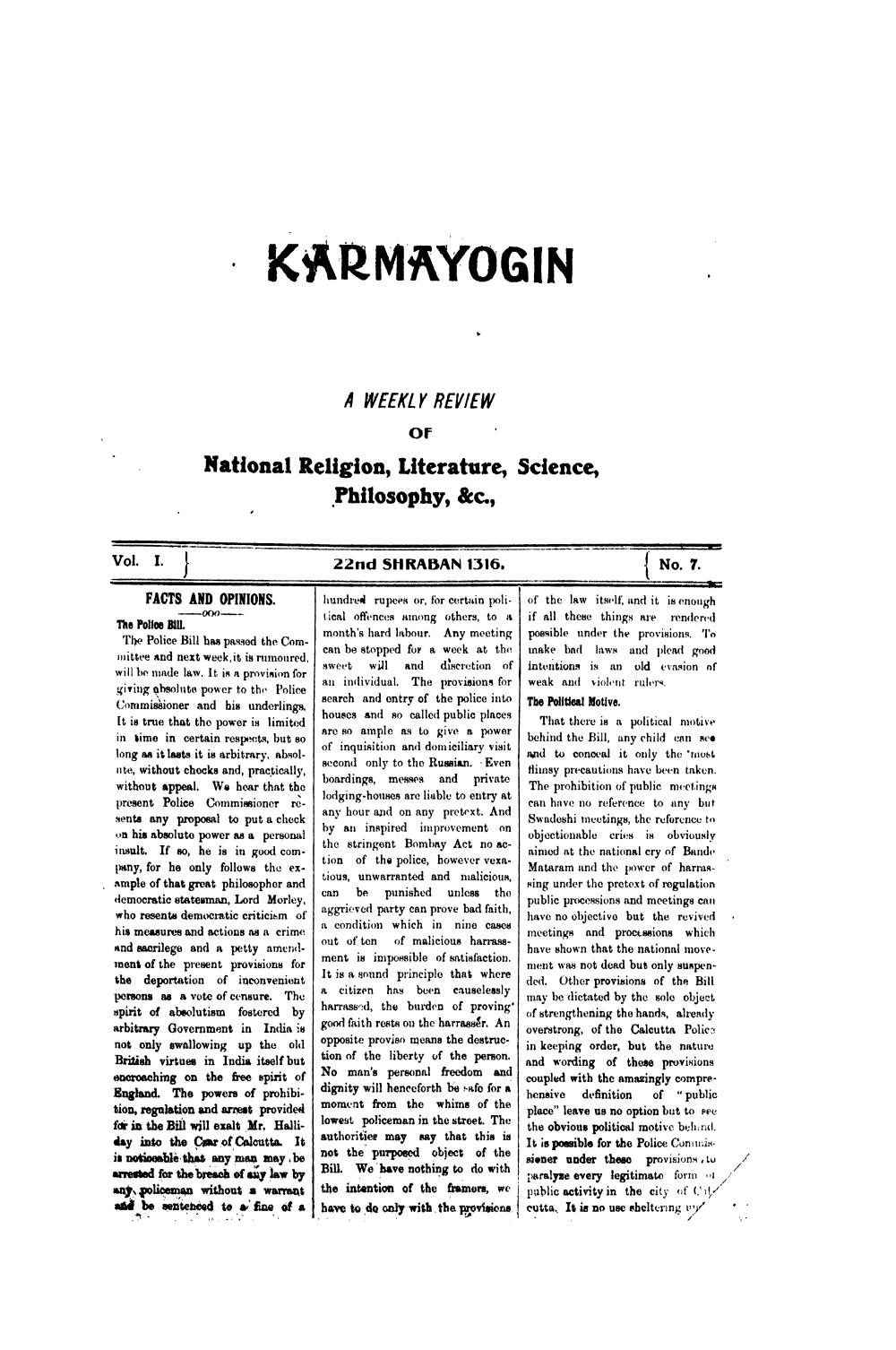________________
KARMAYOGIN
A WEEKLY REVIEW
OF
National Religion, Literature, Science,
Philosophy, &c.,
Vol. I.
22nd SHRABAN 1316.
No. 7.
FACTS AND OPINIONS.
The Police BILI.
The Police Bill has passed the Committee and next week, it is rumoured, will be made law. It is a provision for giving absolute power to the Police Commissioner and bis underlings It is true that tho power is limited in time in certain respects, but so long as it lasts it is arbitrary, absolnite, without chocks and, practically, without appeal. We hear that the present Police Commissioner re. sents any proposal to put a check on his absoluto power as a personal insult. If so, he is in good compunny, for he only follows the example of that great philosophor and democratic statesman, Lord Morley, who resenta democratic criticism of his measures and actions as a crime And sacrilege and a petty amen! ment of the present provisions for the deportation of inconvenient persons as a vote of censure. The spirit of absolutism fostered by arbitrary Government in India is not only swallowing up the okl British virtues in India itself but encroaching on the free spirit of England. The powers of prohibition, regulation and arrest provided for in the Bill will exalt Mr. Halliday into the Car of Calcutta. It in notioonble that any man may be Arrested for the breach of any law by ing policemen without a warrant will be sentenced to fine of a
hundrun rupees or, for certain poli tical offencos sinong others, to # month's hard Inbour. Any meeting can be stopped for a week at the sweet Will And discretion of an individual. The provisions for search and ontry of the police into houses and so called public places Are o ample as to give a power of inquisition and domiciliary visit second only to the Russian. Even boardings, menges and private lodging-houses are liable to entry at any hour and on any pretext. And by an inspired improvement on the stringent Bombny Act no action of the police, however vexttious, unwarranted and malicious, can be punished unless the aggrieved party can prove bad faith,
condition which in nine cascu out of ten of malicious harrassment is impossible of satisfaction.
It is a sound principle that where A citizen hay buen causelessly harrassod, the burden of proving good frith rests on the harrasser. An opposite provien means the destruction of the liberty of the person. No man's personal freedom and dignity will henceforth be rafo for A moment from the whims of the lowest policeman in the street. The authoritier may say that this is not the purposed object of the Bill. We have nothing to do with the intention of the framers, we have to do only with the provisions
of the law itself, and it is enough if all these things are rendered possible under the provisions. To nake bad laws and pleal good intentions is an old evasion of weak and violent rulers The Political Motive.
That there is a political notive behind the Bill, any child can see And to conceal it only the most Hinsy precautions have been taken. The prohibition of public meetings can have no reference to any but Swadeshi meetings, the ruforence to objectionable cries is obviously nimod at the national cry of Bande Mataram and the power of harrasNing under the pretext of rogulation public processions and meetings can have no objectivo but the revived meetings and processions which have shown that the national move. ment was not dead but only suspended. Other provisions of the Bill may be dictated by the sole object of strengthening the hands, already overstrong, of the Calcutta Polic: in keeping order, but the naturu And wording of these provisions coupled with the amazingly comprehensive definition of "public place" leave us no option but to per the obvious political motive behand. It is possible for the Police Conti sieder under these provisions etu paralyse every legitimato form public activity in the city of C cutta. It is no use sheltering wys
.




